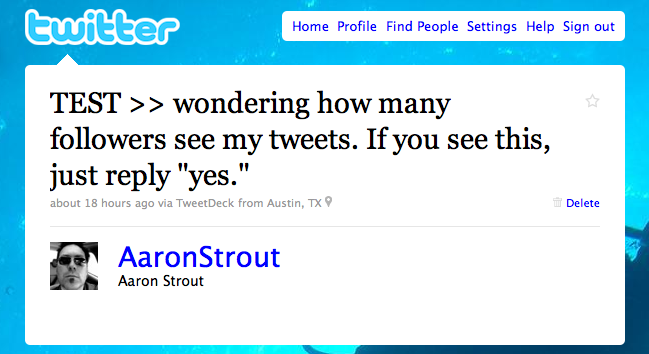 Are “reputation” scores a waste of time or simply misunderstood?
Are “reputation” scores a waste of time or simply misunderstood?
Every time some tool come out that brags about being able to rank influence and reputation, people immediately jump on it as bunk or as a sign of narcissism and a lack of real priorities– of course, those same people jumping on the tools and clumsily Tweeting out their scores (whoops!) is purely “research” (right?).
Klout is an interesting tool that has got attention lately- and been getting bashed a little too (but it must be pretty good because my score isn’t particularly high- yes, I did “research”). A more elegant debunking comes from Edward Boches at his Creativity Unbound blog, where he says he won’t rely on Klout or similar scores to hire social media strategists. He then lays out a lot of excellent traits to look for that may or may not affect an influence score.
Should we disregard these scores then? No, but we shouldn’t rely on them for real “influence” either, as that exists both in and outside of social media. However:
- Comparative scores can help people decide which online “influencers” are worth paying more attention to vs others in a chosen set;
- Comparing your own- or a client’s- score over time as it rises (or.. um, rises- our clients never regress) can help you decide if things you are trying are working;
- If you are keeping a clear head about what these numbers mean (that is, they don;t mean everything), you can use them in a pinch if you are short on time, or combine them with your own analysis to confirm your thinking
People work hard creating these tools– often, they are good for something, though as Edward says, probably not a good sole indicator of hirability.
Taxation Without Comment Moderation is Tyranny(?)
So, Philadelphia wants bloggers to register as businesses for $300, even if they don’t make a profit. Huh? Chip Griffin doesn’t like this poorly thought taxation idea, particularly as it seems to have no minimum threshold. Justin Kownacki seems to see this as part of what is going to happen is social media wants to be taken seriously, even if he doesn’t really like the tax either. I think that’s a stretch.
Power of One- How Many Tweeters are Paying Attention to You Right Now?
Aaron Strout had a nice post focusing on the reasons brands should bother with social media, but the most interesting part of his experiment (to me) is this: when he Tweeted asking people to respond if they saw his Tweet

.5% of his followers responded, most within an hour. As we consider Twitter to be “of the moment” and serendipitous, I find that number remarkable high. Yes, people on Twitter are probably more “on” than the average, but that’s still quite impressive. For me, that would be 125 people responding right away- for brands with huge followings- well, you can see the potential for mobilizing an immediate message.
Owning Your Stuff
I have blogged on the topic before, but Christopher Penn writes wisely of owning your content, reminding us that we own nothing in social media. Chris emphasizes having backups of everything. I add one caveat regarding social media: some things, like Twitter and Facebook, may best be treated as a place for disposable content- stuff you don;t need to save (remember, Twitter is “of the moment?). Or, perhaps, as a place to duplicate the content you also own. Why save Facebook when you can just use Facebook to expose your existing stuff to a new audience? Your strategy may vary, but before you save everything make sure you know what you want to save and what you want to let go.
Media Bullseye Roundtable
I cover that last topic as well as Dunkin Donuts’ Facebook moderation lapse and my previous post on Leo Laporte and blaming an entire concept when one tool fails, on the most recent episode of Media Bullseye’s Radio Roundtable with Jen Zingsheim. I enjoy these chats, which occur weekly with me or one of the other rotating co-hosts. Please have a listen and subscribe!

Twitter Comment
Social Media Top 5: Klout or Out? Blog Taxes, Power of a Tweet [link to post]
– Posted using Chat Catcher